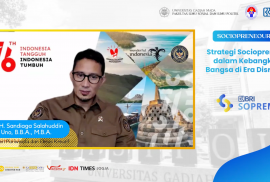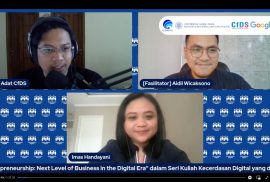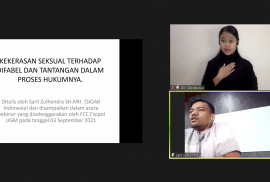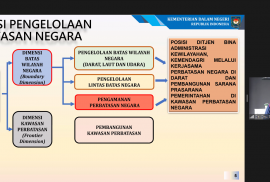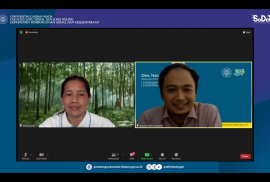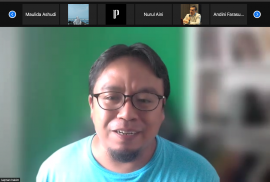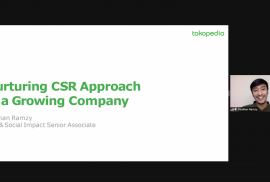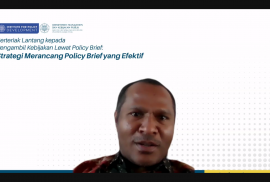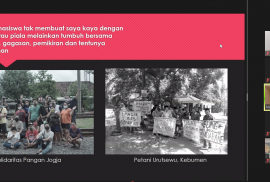Yogyakarta, September 8th 2021─Indonesian Young Sociopreneurs or Soprema UGM again presents a national webinar as one of a series of events in the second year of online Soprema implementation. Held on Wednesday (8/9) through the Zoom Meeting platform, the webinar entitled “Sociopreneur 101: Sociopreneur Strategy in Awakening the Nation in the Era of Disruption” seeks to provide a discussion space for academics and practitioners regarding various alternative strategies for young sociopreneurs. Soprema believes that the COVID-19 pandemic situation is actually a challenge and not an obstacle for young people in carrying out their social businesses.
News
Yogyakarta, September 8th 2021─The Center for Digital Society presents a new learning session in a series of Digital Intelligence classes, namely the Ask Me Anything session. Held for the first time on Wednesday (8/9), the Ask Me Anything session of the Digital Intelligence class collaborated with Google Indonesia to delve deeper into “Digital Entrepreneurship: Next Level of Business in the Digital Era” with the general public, not limited to participants. Digital Intelligence class only. In the Ask Me Anything session which was hosted by Iradat Wirid as the Manager of the Digital Intelligence 2021 course, the speakers and participants had the opportunity to discuss how to run entrepreneurship with digital technologies that are now available, especially those on the Google platform.
Yogyakarta, September 3rd 2021─FISIPOL CRISIS Center (FCC) UGM organizes the safe social space webinar with the title “Disabled and Sexual Violence”. The event was held online and presented two speakers namely Sarli Zulhendra, a member of the Sigab Advocacy Team and Alexander Farrel, one of the disabled students of UGM. In addition, this webinar also presented two signal interpreters, so the event was held quite inclusive. On this occasion, the event was attended by 48 participants with a discussion on sexual violence against disabilities, ways that could be done to prevent sexual violence, and ethics to serve disabled in handling cases of sexual violence.
Yogyakarta, September 1st 2021─The Department of Governmental Politics (DPP) Fisipol UGM held a public lecture titled “State Border Diplomacy” on Monday (01/09). This time, the speaker, Dr. Thomas Umbu Pati, is an alumni of DPP Fisipol UGM who is now the Director of Urban Management and State Border in the Ministry of Internal Affairs. The moderator was Dr. Arie Ruhyanto as a lecturer in DPP Fisipol UGM. The event was held online and attended by 48 people with the topic that spans from the essence of what is a state border to the management of various problems in the border area.
Yogyakarta, August 31st 2021─Career Development Center (CDC) Fisipol UGM again held a career webinar with the title “Become Youngtrepreneur: How to Start Your Online Business?” The event took place online and presented two speakers, they were Massageng W, the Lecturer of the Department of Communication Science of FISIPOL UGM and Sarah Azzahra, the student of FISIPOL UGM and owner of Selingan Foods. Attended by 50 participants, this event explored various topics on tips for building an online business, from planning to how to develop the business.
Yogyakarta, August 30th 2021─The Department of Social Development and Welfare (PSdK) is back with Social Development Talks or SoDeT on Monday (30/8). In a SoDeT titled “Empowerment for Social Mission and Environment: The story of SNV in Empowering Farmers”, the PSdK Department invited the attendees to directly hear the story of SNV as an NGO who empowers farmer with Aang Ilahang as the Rubber Program Manager in SNV.
Aang started his story by giving a short introduction about SNV, both in the global or national case, and the inclusive economy concept that SNV is creating. The inclusive economy concept is implemented through the responsible sourcing from smallholder approach that can improve relations throughout the supply chain and include farmers more. Other than that, the inclusive economy concept is also used to detect unsustainable practices and deforestation in the supply chain.
The event lead by Cut Intan Aulia Isma from the Institute of International Studies was started with a welcoming remarks from the representative of PSKP and The Asia foundation, Muhammad Najib Azca and Sandra Hamid. The three editors of the book “Pandemic, Conflict, and Transformation: Challenges to Democracy and Social Inclusion” also participated in this launching event. Luqman-nul Hakim and Mohtar Mas’oed took part in talking about the book. Meanwhile, the other editor, Frans A. Djalong, took part in being the speaker representing PSKP as well as the UGM Sociology Department with the other two speakers, Sulfikar Amir from Nanyang Technological University Singapore, and Ita Fatia Nadia from the Archive Room and Indonesia’s Women History (RUAS). In their explanation, the speakers also talked about their experience and understanding about the central theme of the book.
Yogyakarta, August 27th 2021─Private companies are one of the important actors in the success of the development process. For this reason, the participation of private companies through corporate social responsibility or CSR activities is important to note. In order to introduce CSR more deeply, the Student Family of the Department of Social Development and Welfare or Kapstra held “AADC: What’s in CSR?” on Friday (27/8). In order to provide a wider perspective, this activity also presented two CSR practitioners with different backgrounds, they were Fardhan Ramzy as CSR and Social Impact Senior Associate at Tokopedia, and Galih Prabaningrum as Lecturer for Social Development and Welfare of FISIPOL UGM.
Yogyakarta, August 27th 2021─As a research center under the Department of Public Policy Management (MKP) of FISIPOL UGM, the Institute for Policy Development or PolDev conducts many assistants and workshops related to economic, socio-political and public policy issues, one of which is related to policy briefs making. On Friday (27/8), through the Zoom Meeting platform, PolDev held a training on writing policy briefs with the title “Scream Out Loud to Policy Makers Through Policy Briefs: Strategies for Designing Effective Policy Briefs” which was opened to the public.
Then entering the main session, the first sharing of material was delivered by Gendis Syari with several important points, namely starting from why people move, how to place positions in a movement, and how we build awareness. Starting from the material about why people move, Gendis made an analogy with a simple case, in general people move because there is hope and there is an interest where they do not get their rights as they should. We need to map out who are the actors who are powerful and who are powerless, to determine alignments in a movement. Building awareness in a movement can be done by learning which further differentiates the student movement from other movements is how we present an academic perspective in the form of studies, writings as the basis for why we move.

